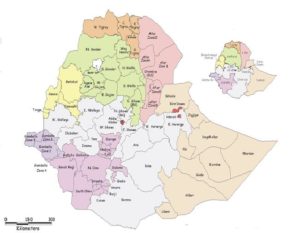መስከረም 25 ቀን 2011 ዓ.ም
የሰብዓዊ መብቶች ጉባዔ (ሰመጉ) ከዚህ ቀደም በቤኒሻንጉልና ኦሮሚያ ክልል አጎራባች አካባቢዎች ብሔርን መሰረት ያደረጉ ግጭቶች ያስከተሉትን ከፍተኛ የሆነ የህይወትና የንብረት ውድመት በአካባቢው በመገኘት በባለሙያዎቹ አማካኝነት በማጣራት የደረሠውን የጉዳት መጠን እና ሊወሰዱ የሚገባቸውን እርምጃዎች ይፋ አድርጓል፡፡ ለትውስታ ያህል ሐምሌ 10 ቀን 2000 ዓ.ም የሰብዓዊ መብቶች ሁኔታ በኢትዮ ጵ ያ በሚል ርዕስ ባወጣው 31ኛ መደበኛ መግለጫ በጉሙዝና ኦሮሞ ብሔረሠብ ዜጐች መካከል በ 09/09/2000 ዓ.ም በተፈጠረ ግጭት 99 (ዘጠና ዘጠኝ) ሰዎች መገደላቸውን፣ በርካታ ሰዎች መቁሰላቸውን፣ 108 የሚሆኑ መኖሪያ ቤቶች መቃጠላቸውን፣ እንዲሁም ከ27‚000 (ሀያ ሰባት ሺ) በላይ ህዝብ መፈናቀሉን በማስረጃ አስደግፎ ይፋ ማድረጉ ይታውሳል፡፡ በመግለጫውም መንግስት በአስቸኳይ ዘላቂና የማያዳግም መፍትሄ እንዲሰጥ ቢያቀርብም መንግስት ለሰመጉ ጥሪ ትኩረት ባለመስጠቱ ዛሬም ብሔርን መሰረት ያደረገ ጥቃትና ግጭት ሊፈፀም ችሏል፡፡
መስከረም 16 ቀን 2011 ዓ.ም የቤንሻንጉል ጉምዝ ክልል ከማሽ ዞን አመራሮች ከምዕራብ ኦሮሚያ አስተዳደር ጥምር ኮሚቴ ጋር የነበራቸውን ስብሰባ አጠናቀው ሲመለሱ ከማሺ ወረዳ ላይ ማንነታቸው ባልታወቁ ታጣቂዎች በተሰነዘረባቸው ጥቃት አራት አመራሮች በመገደላቸው ለግጭቱ መቀስቀስ ምክንያት ሆኗል። ግድያውን ተከትሎም በቤንሻንጉል ጉምዝ ክልል ከማሽ ዞን በሎይ ጅጋንፎ ወረዳ ዳለቻ እና ታንኮና በተባሉ ቀበሌዎች ችግሩ በዋናነት ተፈጥሯል፡፡ ሰመጉ እስካሁን ባሰባሰበው መረጃ መሠረት ከጥቃቱ ጋር በተያያዘ ከ 90,000 (ከዘጠና ሺ) በላይ ዜጐች ቤት ንብረታቸውን ጥለው ወደ አጎራባች አካባቢዎች ተፈናቅለዋል፣ ከ200 በላይ ቤቶች ተቃጥለዋል፣ ከ74 በላይ ክቡር የሰው ህይወት ጠፍቷል፡፡ እንዲሁም በበርካቶች ላይ የአካል ጉዳት ደርሶባቸዋል በርካታ ሰዎችም የደረሱበት ያልታወቀ ሲሆን በርካታ ቁስለኞችም በነቀምቴ ሆስፒታል በመታከም ላይ ይገኛሉ። መረጃዎች እንደሚጠቁሙት ከሟቾቹ ውስጥ በርካታ የፀጥታ ሀይሎችም ይገኙበታል፡፡
ግድያና ማቁሰል
ከሀገሎ ሜጢና አካባቢው ሸሽተው በምዕራብ ወለጋ ነጆ ከተማ ውስጥ ተጠልለው የሚገኙ ተፈናቃዮች እንደገለፁት በቤኒሻንጉል ክልል አንገር ሜጢ ከተማ ውስጥ 13 ሰዎች ተገድለዋል፤ ከእነዚህም ውስጥ ሁኔታውን ለማረጋጋት ሲጥሩ የነበሩ 3 አድማ በታኝ ፖሊሶችና 2 ሴቶች ይገኙበታል፤
ከከማሼና አካባቢው ተፈናቅለው በምዕራብ ወለጋ ቢላ ከተማ ውስጥ የተጠለሉ ተፈናቃዮች እንደገለፁት በከማሼና አካባቢው 31 ሰዎች ተገድለዋል፤ ከእነዚህም ውስጥ 4 ሴቶችና 3 ፖሊሶች ይገኙበታል፤
ከሶጌ፣ በሎ አካባቢዎች ተፈናቅለው በምስራቅ ወለጋ ውስጥ ተጠልለው የሚገኙ ተፈናቃዮች እንደገለፁት በሶጌ፣ በሎና አካባቢው ውስጥ 30 ሰዎች መገደላቸውንና ከዚህም ውስጥ 13 ፖሊሶች ይገኙበታል፤
የቆሰሉ ሰዎችን በሚመለከት ቁጥራቸው በርካታ የሆኑት በነቀምቴ ሆስፒታል፣ በወለጋ ዩኒቨርስቲ ሪፈራል ሆስፒታልና በተለያዩ የግል ሆስፒታሎችና ክሊኒኮች ውስጥ እየታከሙ እንደሚገኙ ለሰመጉ በአካባቢው የሚገኙ ታማኝ ምንጮች አስረድተዋል፡፡
ሰመጉ በቅርብ ግዜ ውስጥ ከላይ የተጠቀሱትን የሰብዓዊ መብቶች ጥሰቶችና በእስካሁኑ የመረጃ አሰባሰብ ያልተደረሰባቸውን በሁለቱም ወገኖች መካከል የደረሰውን ሰብዓዊና ኢኮኖሚያዊ ውድመት እንዲሁም የችግሩን መነሻ ምክንያቶች በስፋትና በጥልቀት በመመርመር በመግለጫ ይፋ እንደሚያደርግ ከወዲሁ ይገልፃል፡፡
ማፈናቀል
በቤኒሻንጉል ክልል ነዋሪ የነበሩ ዜጐች በግጭቱ ምክንያት የመኖሪያ አካባቢያቸውን በመልቀቅ በምስራቅ ወለጋ በ13 ጣቢያዎች በዲጋ ወረዳ አርጆ ጉደቱ፣ ላሲጋ፣ ጊዳ ኪረሙ፣ ጊቶ ጊዳ፣ በተለያዩ ቦታዎች፣ በነቀምት ከተማ ወለጋ ዩኒቨርስቲ፣ መምህራን ትምህርት ኮሌጅ፣ የነርሶች ማሰልጠኛ፣ 05 ቀበሌ፣ 07 ቀበሌ፣ ዳርጌ 2ኛ ደረጃ ት/ቤት፣ ዳንዲቦሩ ኮሌጅ፣ በ 9 መጠለያ ቦታዎች፤ እንዲሁም በምዕራብ ወለጋ ነጆ ወረዳ አስተዳደር አዳራሽ ነጆ ደር መጂ ወረዳ ቢላ ከተማ 2ኛ ደረጃ ት/ቤት ተጠልለው ይገኛሉ። በአጠቃላይ ከቤኒሻንጉል ክልል ተፈናቅለው በምዕራብና ምስራቅ ወለጋ ተጠልለው የሚገኙ ተፈናቃዮችም ከ90,000 በላይ እንደደረሰ ሰመጉ ከአካባቢዎቹ ያሰባሰባቸው መረጃዎች ያሳያሉ፡፡ ሰመጉ ከአካባቢው ያሰባሰባቸው መረጃዎች እንደሚጠቁሙት ግጭቱ አሁንም ያልቆመ ሲሆን በርካታ ተፈናቃዮች በየጫካው ተበትነው ይገኛሉ፤ የተጠፋፉ ቤተሠቦችንም ማገናኘት አልተቻለም፡፡ የምስራቅ ወለጋ ዞን አስተዳደር ባሁኑ ሰዓት የተፈናቃዮች ቁጥር ከአቅማቸውና ከቁጥጥራቸው በላይ በመሆኑ የሁሉም አካላት እርብርብ እንደሚያስፈልግ ለሰመጉ ገልፀዋል፡፡ በዚህ አጋጣሚም መንግስት ከሚመለከታቸው አካላት ጋር በመቀናጀት ለተጎጂዎችም የምግብ፣ የንፁህ መጠጥ ውሃ፣ የአልባሳትና የመድሀኒት አቅርቦት በአስቸኳይ እንዲያቀርብ ሰመጉ ይጠይቃል፡፡
ብሔርን መነሻ ባደረጉ ጥቃቶች እና ግጭቶች ምክንያት ባለፉት አምስት ወራት ብቻ በተለያዩ ክልሎች ከሁለት ሚሊዮን በላይ ዜጐች ከመኖሪያቸው ተፈናቅለዋል፤ በመቶዎች የሚቆጠሩ ተገድለዋል፤ በርካቶች ቆስለዋል፡፡ ከዚህም በላይ ዜጐች በገዛ ሐገራቸው በሰላም ወጥቶ የመግባት ዋስትናቸው ጥያቄ ውስጥ ወድቋል፡፡ መንግስት የዜጐችን በሕይወት የመኖር፣ በሐገሪቱ በፈለጉበት አካባቢ ተንቀሳቅሶ ኑሮን የመመስረትና ንብረት የማፍራት ሕገመንግስታዊ መብቶች እንዲጠብቅ እና እንዲያስከብር ሰመጉ ጥሪውን በድጋሚ ያቀርባል፡፡ በተጨማሪም መንግስት በሐገሪቱ በተለያዩ አካባቢዎች እየተፈፀሙ ላሉት ጥቃቶች እና ግጭቶች ተገቢዉን ትኩረት በመስጠት እየተባባሰ የመጣውን ችግር በዘላቂነት ለመቆጣጠር ሕብረተሰቡን እና የተለያዩ የፖለቲካ ኃይሎችን ያማከለ፣ ዘላቂ፣ ሕጋዊ እና ፖለቲካዊ መፍትሔ እንዲወስድ ሠመጉ ያሳስባል፡፡

